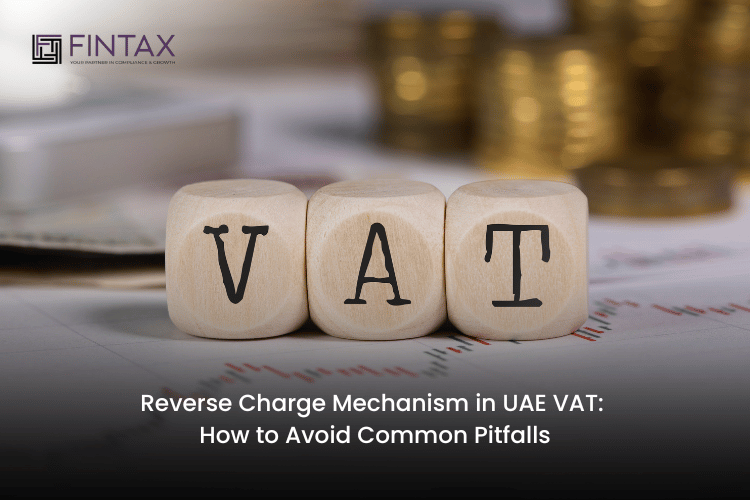Reverse Charge Mechanism in UAE VAT: How to Avoid Common Pitfalls
German FinTax
October 25, 2025

Many UAE businesses unknowingly misapply the Reverse Charge Mechanism (RCM), and the issue often surfaces only during an FTA audit or review. The good news is that once you understand how it works, RCM is one of the simplest VAT concepts to get right.
The Reverse Charge Mechanism (RCM) remains one of the most misunderstood aspects of the UAE’s VAT system. While it plays a crucial role in ensuring fair tax collection, especially for cross-border transactions, many UAE businesses still make avoidable mistakes when applying it.
In this guide, German FinTax Consultancy breaks down the concept of the Reverse Charge Mechanism, explains how it works under UAE VAT law, and highlights common pitfalls that could lead to FTA penalties, along with practical tips to avoid them.
What is the Reverse Charge Mechanism (RCM)?
Under normal VAT rules, the supplier of goods or services is responsible for charging VAT and remitting it to the Federal Tax Authority (FTA). However, under the Reverse Charge Mechanism, this responsibility shifts from the supplier to the buyer or recipient of the goods or services.
This mechanism is primarily designed for imported goods and services, where the supplier is located outside the UAE and not registered for VAT.
In simple terms: under RCM, the supplier doesn’t charge VAT, instead the buyer accounts for VAT. The buyer records VAT both as output (as if they charged it) and input (as if they paid it). If the purchase is fully for business use and input tax is recoverable, the two entries cancel each other out.
When Does the Reverse Charge Mechanism Apply in the UAE?
The RCM applies to several types of transactions, including:
- Import of goods from outside the UAE
- Import of services where the supplier is not VAT-registered in the UAE
- Certain domestic supplies, such as gold, hydrocarbons, and crude oil, under specific conditions
- Transactions between Designated Zones, depending on the nature of goods and the place of supply
In practice, this means if you’re purchasing foreign consultancy, cloud software, or digital marketing services, RCM likely applies even if the supplier invoice shows no VAT.
Example of Reverse Charge Mechanism
Let’s say a company in Dubai purchases consultancy services from a UK-based firm.
- The UK supplier does not charge VAT as they’re not UAE-registered
- The Dubai company must self-account for 5% VAT on the value of services
- The company records this amount as output VAT and simultaneously as input VAT, resulting in no actual cash payment, provided it’s a taxable business expense
Common Pitfalls Businesses Make with RCM
Despite its simplicity in theory, many businesses struggle with practical compliance under RCM. Here are the most common mistakes:
- Forgetting the Double Entry: Businesses often record only the input VAT or output VAT and not both, which breaks the RCM chain
- Missing Imported Services: Many overlook foreign online subscriptions, software tools, or consultants that fall under RCM
- Weak Recordkeeping: Missing invoices, contracts, or import papers can lead to disallowed VAT recovery
- Ignoring Non-Recoverable Input VAT: Certain expenses (like employee benefits or restricted costs) may not be fully recoverable
- Wrong VAT Return Boxes: Misreporting RCM entries in the return often triggers FTA scrutiny, or penalties
How to Avoid These RCM Mistakes
- Conduct Regular VAT Health Checks: Have professionals periodically review your VAT returns to ensure full RCM compliance
- Maintain Proper Supporting Documents: Keep invoices, contracts, customs declarations, and import documents organised
- Train Your Finance Team: Ensure staff fully understand how to identify and record RCM transactions
- Use Accounting Software with RCM Features: Tools like Zoho Books or QuickBooks UAE can automate RCM entries accurately
- Seek Professional VAT Advisory: German FinTax Consultancy ensures accurate reporting and compliance with FTA guidelines
Why RCM Compliance Matters
- Avoid Penalties: The FTA imposes significant fines for underreporting or incorrect VAT filings
- Ensure Smooth Audits: Proper RCM accounting builds credibility during FTA reviews
- Improve Cash Flow: Accurate input tax recovery helps maintain liquidity
Getting RCM right isn’t just about compliance. It’s about protecting your business from unnecessary financial and operational headaches down the road.
How German FinTax Consultancy Can Help?
At German FinTax Consultancy, we specialise in VAT compliance and advisory services tailored for UAE businesses. Our VAT experts assist in identifying RCM transactions, preparing VAT returns, conducting audits, and providing ongoing compliance support.
Whether you’re unsure if RCM applies or simply want peace of mind before your next VAT filing, our team can review your records, flag risks, and correct any gaps before they become costly.
Recent Post
Categories
Any Question?
About German FinTax
German FinTax Consultancy offers expert solutions in taxation, accounting, and compliance to individuals and businesses across the UAE.
- Dubai, United Arab Emirates
- info@germanfintaxconsultancy.com
- +971 50 667 0856
Quick Links
Copyright © 2025 German FinTax Consultancy. All rights reserved
